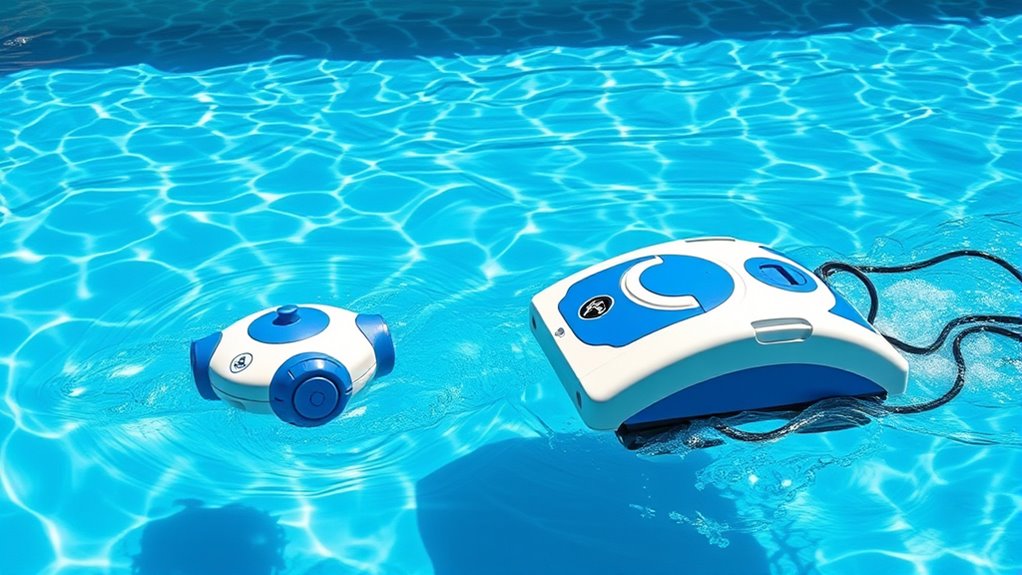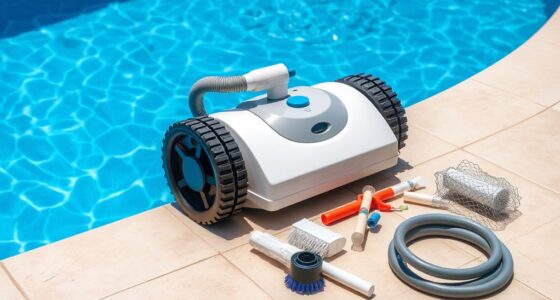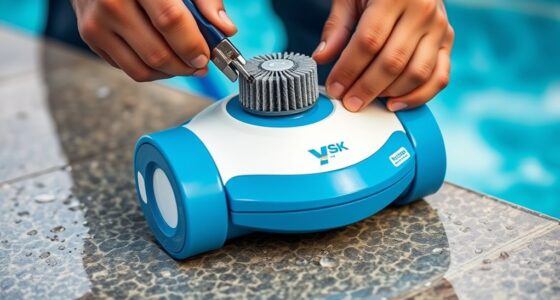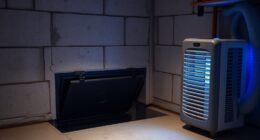Cordless robotic pool cleaners offer greater mobility and ease of use since they are lightweight, don’t rely on cords, and can be operated with remote control, making it easier to navigate around obstacles. However, they may have shorter operating times and less power compared to corded models, which provide stable, continuous cleaning. While cordless options can be more convenient, understanding their maintenance, cost, and performance differences can help you choose the best fit—more details await as you explore further.
Key Takeaways
- Cordless cleaners offer greater mobility and ease of use, while corded models provide consistent power for tougher debris.
- Corded units typically deliver more reliable cleaning performance due to steady power supply.
- Cordless models have longer battery life and quicker charging, enabling longer and more flexible cleaning sessions.
- Corded cleaners require more setup with hoses and secure power connections, whereas cordless models are easier to deploy.
- Generally, cordless cleaners have higher upfront costs but include advanced features, while corded models are more budget-friendly but less portable.
Mobility and Ease of Use
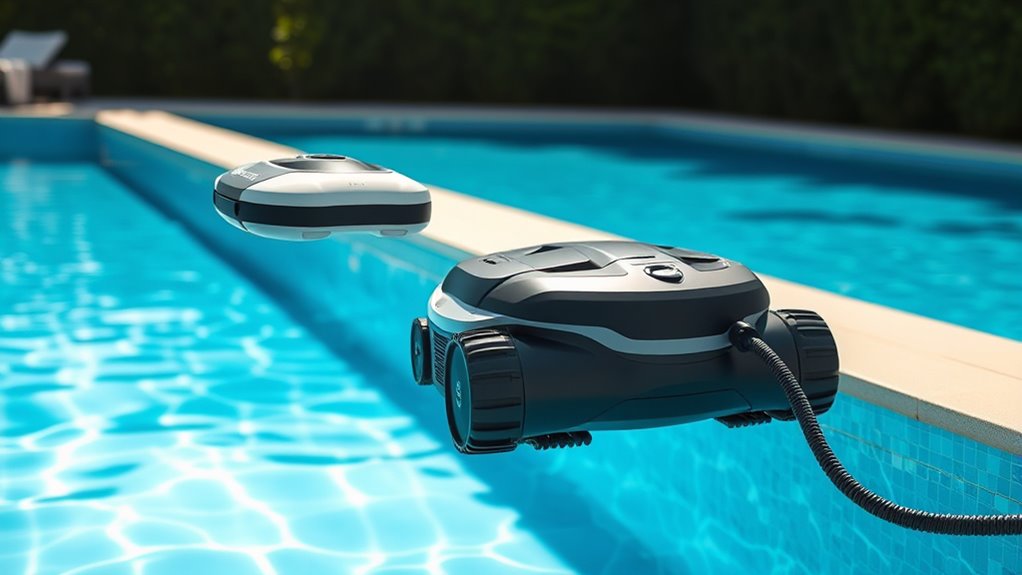
When comparing cordless and corded robotic pool cleaners, mobility and ease of use are key factors to contemplate. Cordless models excel here because they’re lightweight and free from cords that can tangle or limit movement. With a remote control, you can easily direct the cleaner to specific areas without hassle, enhancing your user friendliness experience. This means you spend less time setting up and more time enjoying your pool. Cordless units are also easier to maneuver around obstacles and tight spots, making cleaning more efficient. In contrast, corded models often restrict your movement due to the cord’s length and potential for snagging. Overall, cordless cleaners offer superior mobility and a more intuitive, user-friendly experience, simplifying pool maintenance. Incorporating positive energy and mindset can also make routine cleaning more enjoyable and less of a chore, especially when focusing on well-being and stress reduction. Additionally, considering the technology and features available in newer models can further enhance your cleaning experience, making it more effective and hassle-free. Modern battery technology continues to improve, extending runtime and reducing charging times for cordless units, which adds to their convenience. Furthermore, advancements in energy monitoring features contribute to more efficient operation, helping you save on utility costs over time.
Power and Cleaning Performance
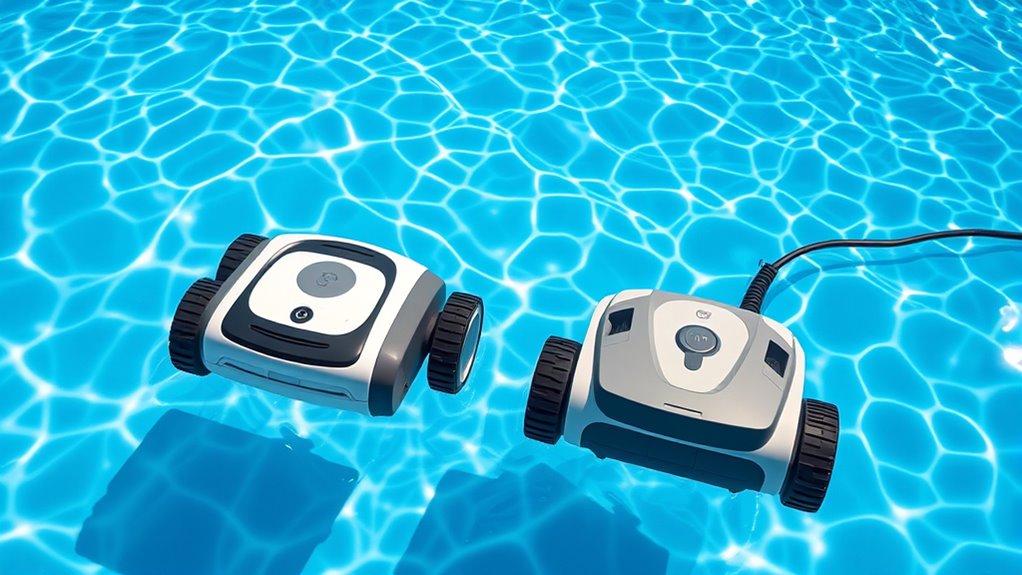
While cordless robotic pool cleaners often prioritize convenience, their power and cleaning performance can vary compared to corded models. Corded cleaners typically deliver consistent power, allowing them to handle stubborn dirt and debris more effectively. In contrast, cordless units rely on battery power, which affects their battery lifespan and, consequently, their ability to clean thoroughly in one session. Additionally, noise levels differ; cordless models tend to operate more quietly, making them less disruptive. However, their reduced power may mean they miss spots or struggle with heavier debris, especially if the battery is nearing the end of its lifespan. Advancements in battery technology are gradually improving cordless models’ ability to perform longer and more effectively. Incorporating power consistency ensures more reliable performance during cleaning cycles. Moreover, the development of smart navigation systems is enhancing the overall efficiency of both cordless and corded units. Ultimately, if powerful cleaning and thorough coverage are your priorities, corded models generally provide more reliable performance. AI security technologies are increasingly integrated into smart pool systems to enhance their functionality and safety.
Operating Time and Battery Life
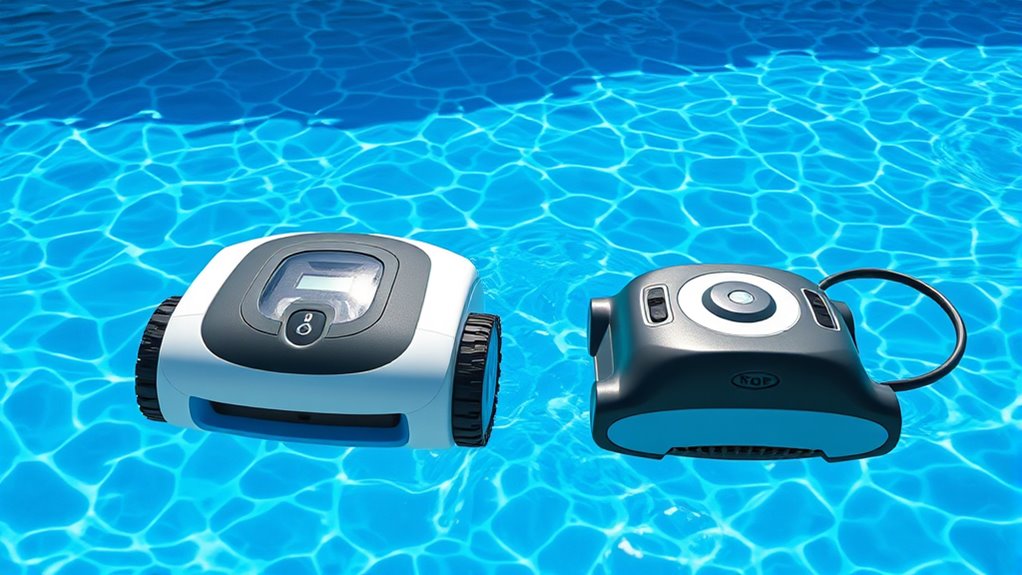
Operating time and battery life are crucial factors to contemplate when choosing between cordless and corded robotic pool cleaners. Your decision depends on the battery capacity, which determines how long your cleaner can operate before needing a recharge. Higher battery capacity typically means longer cleaning sessions, giving you more coverage in a single run. Charging duration also matters; a shorter charging time allows for quicker turnaround between cleaning cycles. Cordless models often boast longer operating times due to larger batteries, but they require sufficient charging durations. Conversely, corded cleaners don’t rely on batteries, so they can run continuously without concern for battery life. Consider how much cleaning you need to do and your patience for recharging when evaluating these factors. Additionally, battery technology continues to advance, offering improved performance and longer-lasting power sources. As battery efficiency improves, newer models can provide even greater operating times with faster recharge capabilities, making them more convenient for frequent use. Moreover, advancements in energy storage also contribute to better overall battery performance and durability.
Setup and Maintenance Requirements
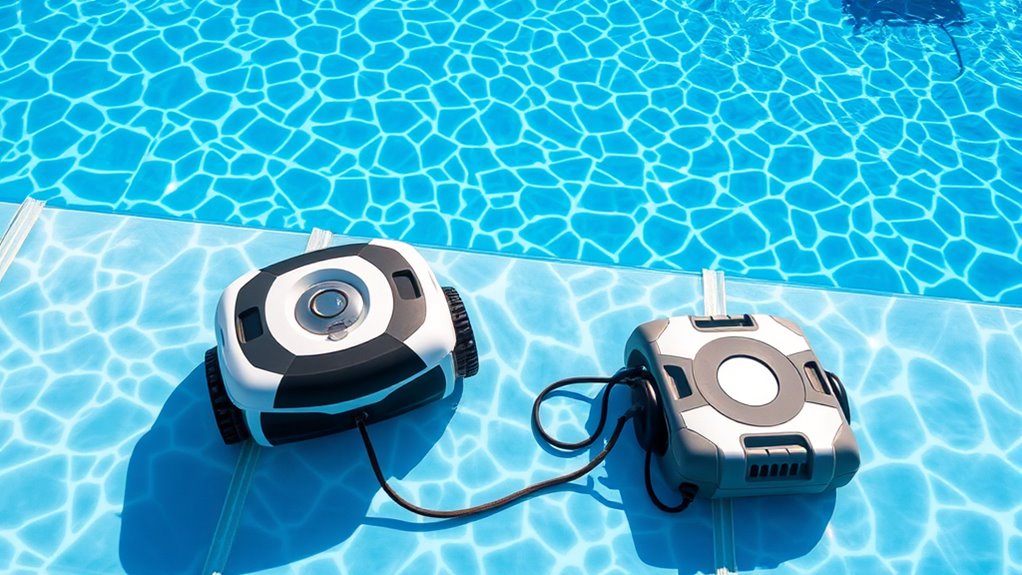
Setting up and maintaining your robotic pool cleaner varies markedly between cordless and corded models. For larger pool sizes, corded cleaners often require longer hoses and secure power connections, making setup more involved. You’ll need to regularly check and clean filters to guarantee peak performance. Cordless models, on the other hand, are easier to deploy since they don’t rely on cables; however, they need frequent battery charging, especially for bigger pools. Water chemistry impacts maintenance too—if your water is unbalanced, it can affect the cleaner’s efficiency and longevity. You should routinely inspect brushes and filters, and adjust cleaning schedules based on pool conditions. Proper setup and maintenance help extend your cleaner’s lifespan and keep your pool pristine. Additionally, incorporating sound healing techniques during cleaning routines can promote relaxation and reduce stress while maintaining your pool area.
Cost and Value for Investment
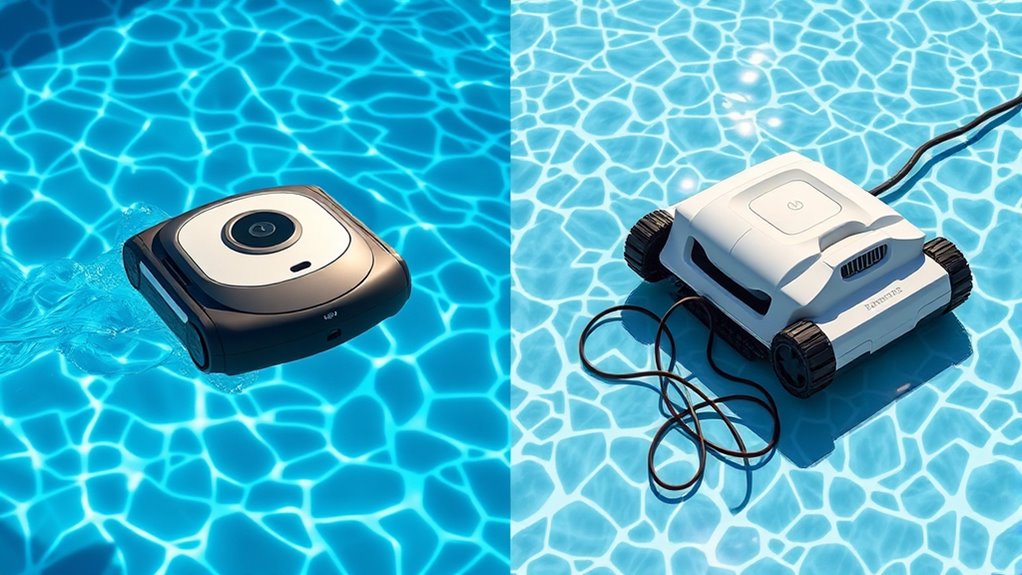
Cordless and corded robotic pool cleaners differ considerably in their initial costs and long-term value. Cordless models often have a higher upfront price due to advanced battery technology and features. However, they can offer better mobility and convenience. When evaluating cost, consider:
- Battery longevity, which affects how often you’ll need replacements or recharges
- Warranty coverage, providing peace of mind against possible repairs
- Maintenance costs for replacing parts over time
- Energy efficiency, impacting ongoing expenses
- Ethical hacking techniques can also be applied to assess the security of the pool’s smart systems, ensuring safety from potential cyber threats.
- Additionally, understanding the total cost of ownership can help you make a more informed decision about which cleaner provides the best long-term value. Evaluating the battery performance and how it influences overall usability can also be crucial in your decision-making process.
- Considering the smart features such as app control and remote monitoring may further enhance the value of a cordless model.
While corded cleaners usually cost less initially, they may incur higher energy bills and limited flexibility. Investing in a cordless cleaner might seem costly at first, but the benefits of longer battery life and solid warranty coverage can enhance overall value and reduce long-term expenses.
Frequently Asked Questions
How Do Corded and Cordless Pool Cleaners Handle Different Pool Shapes?
When it comes to handling different pool shapes, your pool cleaner’s pool shape flexibility and obstacle navigation are key. Corded models often struggle with complex designs due to limited cable length, while cordless cleaners easily adapt thanks to their lightweight, maneuverable design. You’ll find that cordless options navigate obstacles more efficiently, making them ideal for irregularly shaped pools. For easier cleaning across varied shapes, cordless cleaners offer better agility and flexibility.
Are Cordless Models Suitable for Large or Deep Pools?
If you’re considering a cordless pool cleaner for large or deep pools, think about its battery life, weight, and portability. While cordless models are lightweight and easy to maneuver, their battery life might limit cleaning time for bigger pools. You’ll want a model with a strong battery to cover extensive areas without frequent recharges. Overall, their portability makes them a good choice, but confirm the battery capacity meets your pool’s size for effective cleaning.
What Safety Features Are Common in Corded Versus Cordless Pool Cleaners?
Did you know that 85% of pool accidents involve electrical malfunctions? Safety features in pool cleaners include automatic shut-off when lifted, grounded cords, and secure connections. Corded models often have robust grounding and waterproof designs, while cordless ones rely on battery life and safe charging stations. These features help prevent shocks and guarantee safe operation, giving you peace of mind while enjoying your clean pool.
Can Cordless Cleaners Operate in Saltwater Pools Without Damage?
You wonder if cordless cleaners can handle saltwater pools without damage. Most are designed with saltwater compatibility in mind, but you should confirm this before use. Saltwater can affect battery longevity, so look for models with corrosion-resistant parts and high-quality batteries. Proper maintenance and rinsing after use help extend their lifespan. With the right features, cordless cleaners can operate safely and effectively in saltwater environments.
How Do Weather Conditions Affect the Performance of Each Type?
Weather conditions can impact your pool cleaner’s performance, whether cordless or corded. Rain and humidity may cause short circuits or corrosion, affecting battery life and cord durability. Extreme heat can drain batteries faster, reducing runtime. Wind and storms might tangle cords or push debris away, making cleaning less effective. To keep your cleaner working well, store it properly and avoid harsh weather, ensuring peak performance and longevity.
Conclusion
Whether you choose cordless or corded robotic pool cleaners, consider mobility and ease, power and performance, operating time and battery life, setup and maintenance, and overall cost. Weigh convenience against endurance, flexibility against reliability, and upfront costs against long-term value. By comparing these factors, you can make a confident decision that suits your needs, enhances your pool experience, and keeps your swimming space clean with minimal effort and maximum satisfaction.
